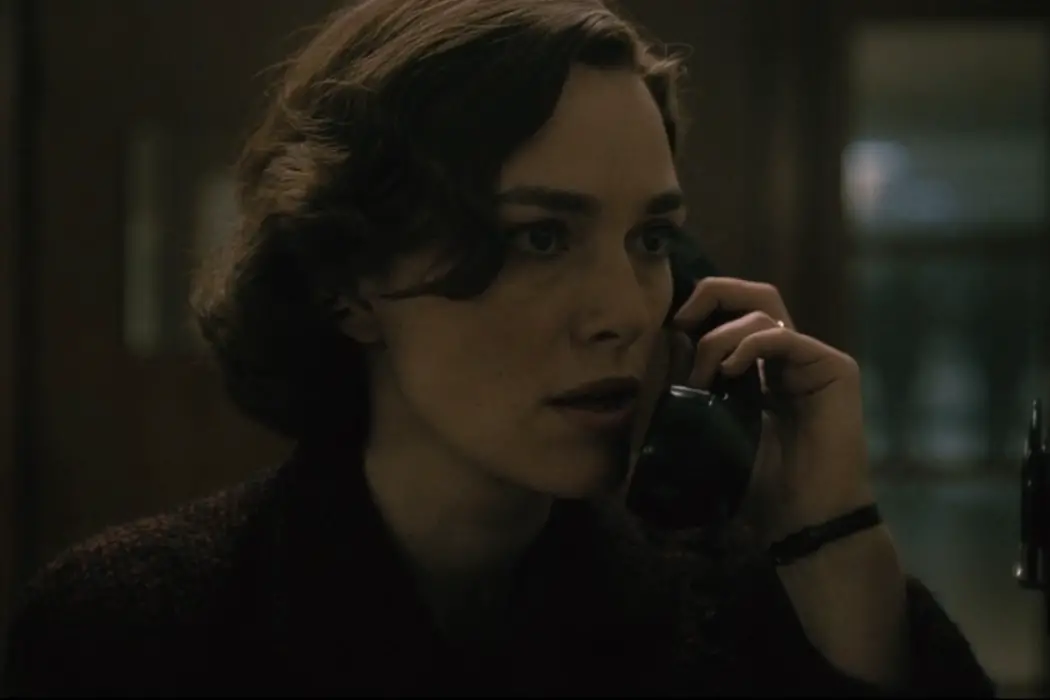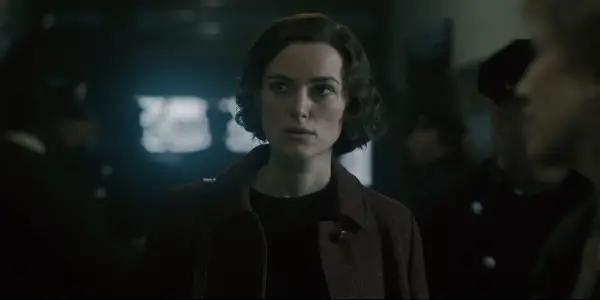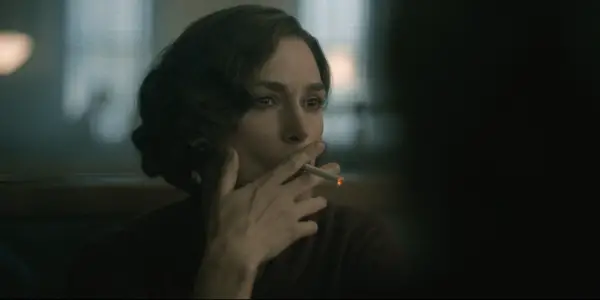BOSTON STRANGLER: Stay Sexy And Don’t Get Strangled

Film critic, Ithaca College and University of St Andrews graduate,…
In the 1960s, when 13 women were strangled to death in the Greater Boston area, there were three American films made about the so-called “Boston Strangler.” The first, The Strangler, premiered in April 1964 — only three months after the 13th victim was killed. The second and third, No Way to Treat a Lady and The Boston Strangler, premiered in 1968. The murders were still fresh in the public mind then, and experts continued to debate the case. These three films each focus on the killer, because of course they do — Psycho had just come out in 1960, the serial killer role was always a juicy one for an actor, and the “Strangler” case is so controversial that any explanation of a killer’s identity and motivations was likely to satisfy an audience. Plus, as a rule, Hollywood folks are pretty uncreative, and it’s way easier to tell a story from the perspective of the Boston Strangler than… like… you know, anything factual. As a bonus treat, the 1968 ones also foreground the police as the heroes. And everyone’s a man, naturally, except for the victims.
The 2023 film — titled, rather uncreatively, Boston Strangler, presumably for SEO purposes — is somehow the only film that actually covers the entire case while sticking pretty close to the facts. It doesn’t presume to show us too much of the killings. It doesn’t extol the police, since they were pretty useless. And it never sexualizes the victims or treats them like women in horror movies. But most importantly, it’s also just really great. Boston Strangler is the best serial killer movie since Se7en, the best journalism movie since Spotlight, and the best serial killer–journalism movie since Zodiac.
A Boston Strangler Story For The True-Crime Era
The Boston Strangler is a cornerstone of true crime in America. “Stay sexy and don’t get strangled,” a certain podcaster duo might have said if they were in Boston in the early 1960s. My Favorite Murder might not have done an episode on the killings, but plenty of other true-crime podcasts have, including two solely devoted to the case. The 2023 Boston Strangler film feels very contemporary. Some of that is due to its historical accuracy: The facts of the case are more intransigent now than they were in 1968. But also, you can sense the residual flavor the film has of cultural true-crime oversaturation, the way a lemon LaCroix has the lingering taste of cleaning fluid.
True-crime stories like the Boston Strangler continue to captivate audiences — especially women. A YouGov survey of 1,000 Americans found that women were not only more likely than men to cite true crime as their favorite genre, but they’re more likely to believe that true-crime content has a positive social outcome, whether it be solving cold cases or shedding light on the justice system. Furthermore, Sword and Scale host and thundering dumbass Michael Boudet claimed that 70% of his listenership is women between the ages of 25 and 45. (Interesting, if not entirely relevant, note to underline the scumminess of the true-crime genre: Boudet once polled his Twitter followers asking them to vote for which race they prefer murder victims to be.)

Boston Strangler wouldn’t be the same film were it not for the wild success of podcasts like Serial, My Favorite Murder, and Crime Junkie and series like The Jinx, Making a Murderer, and that Netflix Dahmer series. In fact, without them, Boston Strangler probably wouldn’t exist at all. But as opposed to the trashy, exploitative, armchair psychologist nature of most of our true-crime media, Boston Strangler embodies the trend in more intelligent, compelling ways that remain faithful to the real-life case. The film follows two women journalists, Loretta McLaughlin (Kiera Knightley) and Jean Cole (Carrie Coon), as they break the story of the murders and find suspects, motives, and patterns while Boston’s police department is mired in incompetence and carelessness.
The perspective of women journalists is crucial to Boston Strangler. Loretta and Jean succeed because their keen perspective and persistent reporting allow them to find connections law enforcement can’t. And for the audience, the film works because we believe Loretta and Jean are right, and because there’s something vengeful about two women working to catch a man who kills women.
Writer-director Matt Ruskin shows the investigation in a thrilling way, but not the murders themselves — they’re nearly always staged off-screen. Heard but rarely shown. The satisfaction of Boston Strangler isn’t any scummy B-movie sleaze; it’s comparable to Spotlight and All the President’s Men in that smart, committed reporters going against the system to learn the truth will always be way more interesting than watching someone commit a crime. Call me a nerd if you want, but there’s a scene where Loretta and Jean need to track down a source, so they whip out some phonebooks and begin calling everyone with the same surname, and I’ve rarely been so giddy watching anything. Reject violence, embrace analogue journalism, etc.
Catharsis is key to true crime. And though Loretta, Jean, and the Boston Police Department didn’t know in the 1960s what we know today about the Boston Strangler killings, Ruskin tweaks the facts a bit to score a little catharsis. His film isn’t as accurate as a documentary treatment of the subject might be, but Ruskin seizes the opportunity to take all the revelations of bad policework, missed connections, and multiple-killer theories and pack them into the film to tell a more complete, fulfilling, and inclusive story than anyone could’ve made in the ‘60s — hindsight, it seems, is 20/23.
Feminism!
The 1960s was the era of second-wave feminism, of icons like Gloria Steinem, Betty Friedan, and my grandma. Issues like gender discrimination in the workplace, childcare, the nuclear family, and equal pay were being introduced and discussed literally at the same time that Loretta and Jean were girl bossing their way through Boston trying to catch a killer. It’s not subtextual, either — the film explicitly portrays how women in the newsroom of the Boston Record American typically didn’t leave the lifestyle desk, how the editor doubted Loretta’s ability to adequately cover the story, and how the police immediately used Loretta’s gender to question the validity of her reporting. Bill Camp drops by to do some great frothing at the mouth as the police commissioner, furious that Jack’s paper is sending a woman to cover the killings.

Loretta and Jean are in the same shitty boat: They’re expected to raise their kids, every move they make at work seems like they’re fighting an uphill battle, and their husbands kind of suck. (Not slander, just the way the film portrays them — also, the film definitely implies that Loretta’s husband, played by Morgan Spector, is having an affair.) Knightley and Coon give some of the best performances of their careers, and they get so many women-helping-women scenes. Like… Loretta opting to drive right past her house and instead go to the bar to have a whiskey with Jean and smoke a cigarette is the coolest thing ever.
Even Knightley’s performance underlines the film’s themes. Knightley usually has quite a high-pitched, borderline-haughty wheeze effect in her voice. I always remember her incredible scoffs in the Pirates of the Caribbean franchise more than her quiet, poised turn in Pride & Prejudice. But here, she speaks in a lower register. She has visible restraint in her speech, and it’s only when she gets excited that she lets her voice slip back into familiar Knightley territory. But the reason Loretta has settled into her lower pitch is so that at press conferences or meetings, her questions aren’t too distinguishable from the men’s.
The film’s examination of second-wave feminism isn’t limited to its leads. After Beverly Samans is found dead, her mom (Pamela Jayne Morgan) tells Loretta, “She was doin’ all the things I wished I coulda done with my own life.” Hell, the film’s ending even suggests that the Boston Strangler killings aren’t isolated, lunatic instances, but rather reminders that no matter how much freedom women win, no matter what victories the women’s rights movement achieves, men will still kill women.

I’d imagine many viewers are pissed off about the film’s ending. Many critics already have decried both the film’s tweaking of the facts and its ambiguous ending. I’d hate to be the one to have to tell them this, but this is based on shit that actually happened, and real life doesn’t come with easy answers or tidy conclusions. Boston Strangler is great because of how much it resists the allure of a simple ending, of an easy way out. Especially because the desire for an easy answer is what led to the conviction and imprisonment in 1967 of a dude who, if you believe the film, very likely didn’t even commit all the murders. Hopeful narratives, fake closure, and razzle-dazzle are not what audiences should ask for from true-crime media. Boston Strangler makes clear that there’s nothing glitzy, seductive, exciting, or auspicious about the victims.
Conclusion:
It breaks my heart that Boston Strangler, one of the smartest crime films of the last few years, has been unceremoniously dumped on streaming. It’s Ruskin’s biggest project to date in terms of budget, cast, and scope, and the dude knocks it out of the park. His cast is totally game to perform this material in a believable, grounded way, especially Coon and Knightley. Alessandro Nivola is reliably charming, even if his character is the kind of cop who takes two puffs of a freshly lit cigarette and then tosses it across the parking lot. David Dastmalchian, always welcome in a dingy period piece, also shows up, proving he’s got the market cornered when it comes to playing creepy bastards. The guy can’t catch a break. How is it that Dastmalchian’s most normal role is in the Ant-Man films?
Many critics have called Boston Strangler a Fincher rip-off, mostly on the basis of one scene where Loretta follows a guy who’s giving off Murder Vibes into his dimly lit house. But look — Ben Kutchins lights Boston in a much more subtle way than Fincher’s films, and the sickly tungsten indoors, chainsmoking haze hanging around the newsroom, and twilight-blue hues in the daytime really convince you that sunlight never gets to Boston. And if the accusations of ripping off Fincher stem from the serial killer investigation plot… I’m sorry, but did he trademark journalism movies about murderers? We might as well boycott Knock at the Cabin because Sam Raimi made two films set in a cabin 40 years ago.
Just don’t go in expecting a fanciful crime romp. Boston Strangler is better than, like, 90% of true crime out there, with all the loose ends, messiness, and horror that comes with sticking so close to the real case. In a world where Netflix is pumping out low-effort true-crime doc content on a weekly basis, Boston Strangler is a sterling example of how it should be done.
Boston Strangler is now streaming on Hulu.
Watch Boston Strangler
Does content like this matter to you?
Become a Member and support film journalism. Unlock access to all of Film Inquiry`s great articles. Join a community of like-minded readers who are passionate about cinema - get access to our private members Network, give back to independent filmmakers, and more.
Film critic, Ithaca College and University of St Andrews graduate, head of the "Paddington 2" fan club.













